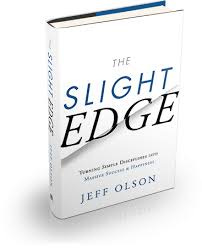7 Key takeaways applied in personal finance from "The Slight Edge" by Jeff Olson
TLDR: Optimism, personal growth, play the long game. It's easy to do and also easy not to do. Your choices compound over time.
The Slight Edge by Jeff Olson is a personal development book that emphasizes the power of small, consistent actions over time to achieve success.
I've read the book so you can save the time, but I also do recommend picking it up to take a read. Perhaps you'll have different takeaways? If so, I’ll like to hear from you and do comment below your thoughts.
Here are my key learning points applied on personal finance:
1. Small, Daily Actions Compound
“Compound interest is the eight wonder of the world. He who understands it, earns it… he who doesn’t … pays it.” ~ Albert Einstein
Success and failure are not the result of major events but of small, everyday decisions. These small actions, whether positive or negative, compound over time, creating either success or failure.
Small financial habits, like saving $5 a day, may seem insignificant in the short term, but over time, they can grow substantially (read here for my post on compounding and saving your first $100k). For example, by consistently saving $5 a day and investing that money with a modest return (e.g., 7-9% annually through VOO, ETF for S&P 500), you could accumulate significant wealth over decades. The power of compounding makes those small actions more impactful than they initially appear.
2. The Power of Consistency
Doing simple, often mundane tasks every day, consistently over time, is what leads to great success. Olson emphasizes that while these tasks are easy to do, they’re also easy to neglect, which is why consistency is key.
In the world of investing, consistency is key. Following a dollar-cost averaging strategy, where you invest a fixed amount in the stock market at regular intervals (regardless of market conditions), helps build wealth over time. Even during downturns, staying consistent with your investments allows you to buy more shares at lower prices, boosting long-term growth.
Do you know the percentage that you spend (on what categories of expenses - housing, food, transport, interests etc)? I recommend using https://www.spendee.com/. They have an app, colourful and intuitive user interface, so you can easily start tracking your expenses as you spend (before you forget about it).
Consistency in budgeting, saving, and tracking your expenses leads to financial success. For instance, setting aside 10% of your income for savings every month, even when the amount seems small, builds financial discipline and steadily grows your savings. Missing a month may seem harmless, but that inconsistency can slow down your progress. The inconsistency is also what separates the successful vs the mediocre.
3. Mastering Your Habits
Habits are the foundation of success or failure. The slight edge encourages developing positive habits, even when the payoff isn’t immediate, because success is a long-term process.
In investing, cultivating compounding habits such as doing your research, avoiding emotional decisions and reviewing your portfolio regularly can ensure you stay on track with your financial goals.
Take a pause and think about your last stock purchase. What was the reason that made you click on the “buy” button? Was it a hot tip from your friend or “investment guru”? Have you done your research about the company? Is the stock within your circle of competency to understand about the risks of the industry and evaluate its potential?
Also with the all time high of indexes in the equity market, it’s normal that your equities be outweighing the rest of your investment portfolio. Those who develop the habit of regularly reviewing their asset allocation and rebalancing their portfolio can better manage risk and optimize returns.
4. Your Philosophy Shapes Your Life
Olson explains that our results in life are driven by our personal philosophy. By adopting a philosophy of continuous growth and self-improvement, we can change the trajectory of our lives.
An investor’s philosophy—whether they are a long-term investor or a speculator—shapes their strategy and results. If your philosophy is rooted in long-term value investing (à la Warren Buffett), you’re more likely to see steady growth by sticking to sound principles and avoiding market noise. In contrast, a short-term, speculative mindset can lead to high risk and potential losses.
Your approach to money will determine your financial future. If you believe in living below your means and that financial success is a long-term game, you’re likely to make smarter decisions like saving more and spending wisely. A philosophy of "spending to impress others" leads to debt and financial instability, while a philosophy of "financial independence through saving and investing" fosters wealth accumulation.
5. Time is Your Ally
The slight edge relies on the passage of time to see results. Success comes slowly, so patience and perseverance are essential. Over time, small, positive actions compound into significant success.
In personal finance, time is critical. I’ve been also preaching to my children (aged 11 and 9 years old now), the earlier you start saving and investing, the more time your money has to grow. For example, starting to contribute to a retirement fund (CPF in singapore’s context) in your 20s versus in your 40s can result in a vastly larger nest egg by retirement due to the power of compound interest.
I’ve also started buying VOO for them, just S$100 per month and lead them into the investment journey by letting them partake in the growth and power of compounding.
Investing over the long term allows you to ride out market volatility. A person who invests consistently over 30 years will benefit from the overall upward trend of the market. I’ve always taken time for granted until I hit my 40s and come to realise our investment horizon will determine my financial needs and risk appetite.
6. The Importance of Personal Growth
Continuous learning and self-improvement are crucial for progress. Olson highlights the need to read, listen, and engage in personal development consistently to keep progressing.
Investors who prioritize personal growth by staying informed about market trends, learning about investment strategies, or understanding financial reports are better equipped to make smart decisions. For instance, I’ve learned about diversification reduces the risk of putting all your money into one stock and suffering significant losses.
Continuously learning about personal finance—whether through books, podcasts, or courses—can help you make better financial decisions. Understanding concepts like compound interest, debt management, and tax efficiency can lead to better outcomes. For example, learning about tax-advantaged accounts like IRAs and 401(k)s (CPF in singapore’s context) can save you money and help your wealth grow faster.
7. Attitude and Belief Matter
Believing in the process and maintaining a positive attitude is essential. Confidence in the fact that small actions will eventually lead to success helps sustain motivation.
Believing in your ability to improve your financial situation is crucial. If you think “I’ll never get out of debt,” you may not take the necessary steps to do so. On the other hand, believing that small actions (like paying off a bit of debt each month) can make a difference motivates you to stay on track and eventually become debt-free.
If you believe in the long-term growth of the market, you're more likely to stay calm during downturns, rather than panic-selling and locking in losses. For example, during a market crash, maintaining confidence in your investment strategy allows you to stay the course, while those who panic may sell at the worst possible time.
In essence, "The Slight Edge" teaches that success is the result of simple, daily disciplines repeated over time, while failure is the result of simple errors in judgment. Small choices may not seem impactful, but they are the foundation for either success or mediocrity.







